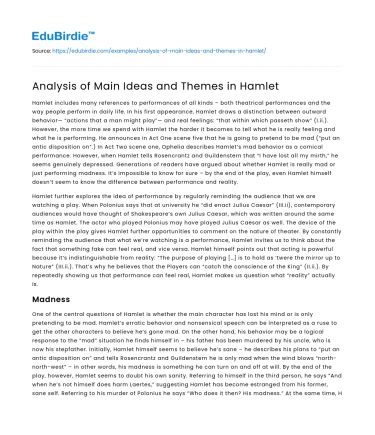Hamlet includes many references to performances of all kinds – both theatrical performances and the way people perform in daily life. In his first appearance, Hamlet draws a distinction between outward behavior— “actions that a man might play”— and real feelings: “that within which passeth show” (I.ii.). However, the more time we spend with Hamlet the harder it becomes to tell what he is really feeling and what he is performing. He announces in Act One scene five that he is going to pretend to be mad (“put an antic disposition on”.) In Act Two scene one, Ophelia describes Hamlet’s mad behavior as a comical performance. However, when Hamlet tells Rosencrantz and Guildenstern that “I have lost all my mirth,” he seems genuinely depressed. Generations of readers have argued about whether Hamlet is really mad or just performing madness. It’s impossible to know for sure – by the end of the play, even Hamlet himself doesn’t seem to know the difference between performance and reality.
Hamlet further explores the idea of performance by regularly reminding the audience that we are watching a play. When Polonius says that at university he “did enact Julius Caesar” (III.ii), contemporary audiences would have thought of Shakespeare’s own Julius Caesar, which was written around the same time as Hamlet. The actor who played Polonius may have played Julius Caesar as well. The device of the play within the play gives Hamlet further opportunities to comment on the nature of theater. By constantly reminding the audience that what we’re watching is a performance, Hamlet invites us to think about the fact that something fake can feel real, and vice versa. Hamlet himself points out that acting is powerful because it’s indistinguishable from reality: “The purpose of playing […] is to hold as ’twere the mirror up to Nature” (III.ii.). That’s why he believes that the Players can “catch the conscience of the King” (II.ii.). By repeatedly showing us that performance can feel real, Hamlet makes us question what “reality” actually is.
Save your time!
We can take care of your essay
- Proper editing and formatting
- Free revision, title page, and bibliography
- Flexible prices and money-back guarantee
Madness
One of the central questions of Hamlet is whether the main character has lost his mind or is only pretending to be mad. Hamlet’s erratic behavior and nonsensical speech can be interpreted as a ruse to get the other characters to believe he’s gone mad. On the other hand, his behavior may be a logical response to the “mad” situation he finds himself in – his father has been murdered by his uncle, who is now his stepfather. Initially, Hamlet himself seems to believe he’s sane – he describes his plans to “put an antic disposition on” and tells Rosencrantz and Guildenstern he is only mad when the wind blows “north-north-west” – in other words, his madness is something he can turn on and off at will. By the end of the play, however, Hamlet seems to doubt his own sanity. Referring to himself in the third person, he says “And when he’s not himself does harm Laertes,” suggesting Hamlet has become estranged from his former, sane self. Referring to his murder of Polonius he says “Who does it then? His madness.” At the same time, Hamlet’s excuse of madness absolves him of murder, so can also be read as the workings of a sane and cunning mind.
Doubt
In Hamlet, the main character’s doubt creates a world where very little is known for sure. Hamlet thinks but isn’t entirely sure, his uncle killed his father. He believes he sees his father’s Ghost but isn’t certain he should believe in the Ghost or listen to what the Ghost tells him: “I’ll have grounds More relative than this.” In his “to be or not to be” soliloquy Hamlet suspects he should probably just kill himself, but doubt about what lies beyond the grave prevents him from acting. Hamlet is so wracked with doubt he even works to infect other characters with his lack of certainty, as when he tells Ophelia “you should not have believed me” when he told her he loved her. As a result, the audience doubts Hamlet’s reliability as a protagonist. We are left with many doubts about the action – whether Gertrude was having an affair with Claudius before he killed Hamlet’s father; whether Hamlet is sane or mad; what Hamlet’s true feelings are for Ophelia.






 Stuck on your essay?
Stuck on your essay?

